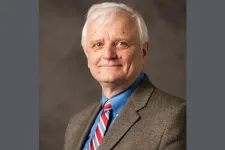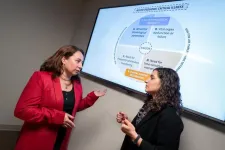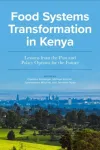(Press-News.org) Embargoed until 1 p.m. CT/2 p.m. ET Monday, Jan. 8, 2024
DALLAS, Jan. 8, 2024 — From humble beginnings as a small professional health society formed by six cardiologists in Chicago in 1924, the American Heart Association has emerged as the nation’s oldest and largest voluntary organization dedicated to fighting heart disease and stroke. Uniting more than 35 million volunteers and supporters and more than 2,900 employees, the Association today is a global force transforming the way the world understands, treats and prevents cardiovascular and cerebrovascular diseases. In 2024, with Bold Hearts™ - the American Heart Association’s Centennial celebration – the organization celebrates 100 years of progress and a vision for a brighter future for all.
“One hundred years ago, heart disease was considered a death sentence. Little was known about what caused it and even less about how to care for people living with and dying from it. Dr. Paul Dudley White, one of the American Heart Association’s founders, described those early years as a time of ‘almost unbelievable ignorance’ about heart disease,” said American Heart Association Chief Executive Officer Nancy Brown. “Through our relentless pursuit of lifesaving research, science and innovation, and our unwavering support of patients, families and caregivers, we are creating healthier communities everywhere and transforming the way we all live, work and play, to empower longer, healthier lives.”
Before the advent of antibiotics, infectious diseases, such as pneumonia, tuberculosis and diphtheria, were the most common cause of death in the industrialized world. Arteriosclerotic cardiovascular disease (ASCVD), characterized by blood vessel plaques and thickening of artery walls, first emerged as a leading health threat in the mid-20th century and has remained the #1 killer of people worldwide, according to the U.S. Centers for Disease Control and Prevention.
“There is much to learn from this historic shift in the reduction of deaths from infectious diseases and the current prevalence in deaths from cardiovascular diseases,” said Joseph C. Wu, M.D., Ph.D., FAHA, the current volunteer president of the American Heart Association, director of the Stanford Cardiovascular Institute and the Simon H. Stertzer Professor of Medicine and Radiology at Stanford School of Medicine. “Through scientific research, technological advances and public health policy, most of these infectious diseases have become controlled, and many have been or are nearly eradicated. As we apply these same clinical and epidemiological methods to the someday hopeful eradication of heart disease and stroke, the American Heart Association is making great progress. Although still too many people die each year, many are living longer, more productive lives while managing their cardiovascular disease and risk factors.”
The inspiration for the Association’s formation came in 1911 from Mary Wadley, a nurse and social worker at Bellevue Hospital in New York City, who believed more could be done to help people who suffered from heart disease. At that time, heart disease was considered so dire that doctors were reluctant to even tell their patients they had it, according to renowned cardiologist and preeminent scientist Dr. Eugene Braunwald, often called the “father of cardiology.” In the first of a series of special Centennial Collection papers, “Cardiology: A Century of Progress,” published in Circulation, the flagship journal of the American Heart Association, Braunwald writes that it was “recommended that patients with serious heart disease not be informed of this, but that a friend or relative should be.” He also notes other treatments of the times:
Recommended therapy for chronic heart disease was extremely limited and consisted of just a few of today’s recommendations – reductions of weight and blood pressure if elevated, and lower salt intake.
There was no specific treatment if one survived a heart attack other than bed rest, a liquid diet and general supportive measures.
While people with high blood pressure were advised to reduce their salt intake and body weight, they were also advised to bathe in tepid water and irrigate the colon once or twice weekly.
“Times have certainly changed over the last century. Bold moves, and dedicated researchers and volunteers, have resulted in significant medical advancements over 100 years, including the first artificial heart valve, implantable pacemakers, cholesterol-lowering medications, techniques for CPR and much more,” said Marsha E. Jones, current volunteer board chairperson for the American Heart Association and former executive vice president and chief diversity officer for The PNC Financial Services Group Inc. “Even with today’s knowledge, gaps remain, particularly in ensuring health care access and quality care for people in diverse and underrepresented populations. That is why the American Heart Association continues to be a champion for health equity with our ‘10 Commitments.’ Through research, advocacy, community work and more, these Commitments are designed to ensure we do all we can to remove barriers to health."
Brown noted that advocacy has been mission-critical in the Association's work for more than 40 years.
“Our grassroots network includes staff and volunteers in Washington, D.C., every state capital and in local communities across the country. We have long been a collaborator in convening powerful coalitions and have built an extensive record of bipartisan success informing and influencing the enactment of evidence-based public policies that lead to longer, healthier lives,” she said. “We were early leaders in the fight for successful tobacco-control policies and have been strong advocates for increasing federal research funding at the National Institutes of Health. Our advocacy priorities also include improving access to quality, affordable health care; increasing access to healthy foods; creating opportunities for physical activity; improving air quality; strengthening the public health infrastructure and systems of care; elevating the importance of addressing racism and other social determinants of health through public policy; and continually ensuring state and local governments address the health concerns of their residents.”
Wu noted that rigorous, innovative research has always been at the core of the mission of the American Heart Association.
“The American Heart Association is recognized as a world leader in advancing groundbreaking research and science,” he said. “Our volunteer experts set the gold standard in patient care through the creation and socialization of research-driven cardiovascular care and CPR guidelines. The Association fosters continuous quality improvement through hospital and health care programs to ensure everyone gets the best possible care – the right care at the right time.”
Each year at a series of scientific sessions and meetings, the Association convenes thousands of top experts from around the world including dedicated and passionate scientists, clinicians, health professionals, patients and others to discuss and debate the latest cardiovascular science and clinical information in the fight against heart disease and stroke. Publication in any of the Association’s 14 peer-reviewed scientific journals is synonymous with quality, relevance and importance in improving the medical knowledge related to cardiovascular and cerebrovascular disease.
With more than $5.7 billion invested in cardiovascular medical research since 1949, the American Heart Association is the nation’s largest nongovernment funder of heart and stroke research – second only to the U.S. government. The Association has funded more than 49,000 projects, leading to significant breakthroughs in cardiovascular and stroke discovery, translation and clinical application. In addition, 15 American Heart Association-funded investigators have won Nobel Prizes, confirming the Association is the focal point for excellence in cardiovascular and cerebrovascular disease research.
“At the heart of everything we do is the powerful commitment of our global family of volunteers, donors, advocates and survivors. From the early days of the Heart Fund when people went door-to-door to collect donations from neighbors, to our record-breaking community Heart Walks, from the generosity of local and national corporate sponsors, to the heartfelt philanthropy of our major donors, the financial support given to the American Heart Association over the years has been game-changing,” Brown said. “Just as noteworthy has been the commitment of time, passion and dedication to our cause given by so many and marked in more ways than we could ever count. ‘Thank you’ seems inadequate and so I want to make a commitment to each person who has made any contribution of any kind to the American Heart Association. As we celebrate our 100th birthday we promise to never stop being a relentless force for a world of longer, healthier lives. As we move into the second century of our work, we are focused on advancing health and hope for everyone, everywhere. Our future is about improving yours.”
Visit heart.org/centennial throughout 2024 to learn more about how the American Heart Association is harnessing 100 years of saving and improving lives to boldly build a second century of equitable health for all, and read stories about the bold hearts that have inspired, invented, imagined and informed heart health.
Additional Resources:
Multimedia is available on the right column of release link https://newsroom.heart.org/news/100-years-of-lifesaving-work-and-counting-happy-birthday-to-the-american-heart-association?preview=e30ac6fe8c43185388abcf0175de63c6.
Spanish news release
Chinese (simplified) news release
After Jan. 8, view the Braunwald manuscript online.
Connect with other survivors, caregivers and patients via the American Heart Association’s online Support Network.
Follow AHA/ASA news on X (formerly known as Twitter) @HeartNews
About the American Heart Association
The American Heart Association is a relentless force for a world of longer, healthier lives. We are dedicated to ensuring equitable health in all communities. Through collaboration with numerous organizations, and powered by millions of volunteers, we fund innovative research, advocate for the public’s health and share lifesaving resources. The Dallas-based organization has been a leading source of health information for a century. During 2024 - our Centennial year - we celebrate our rich 100-year history and accomplishments. As we forge ahead into our second century of bold discovery and impact our vision is to advance health and hope for everyone, everywhere. Connect with us on heart.org, Facebook, X or by calling 1-800-AHA-USA1.
###
END
100 years of lifesaving work and counting: Happy Birthday to the American Heart Association
The American Heart Association is celebrating its Centennial in 2024 with “Bold Hearts” and a vision for advancing health and hope for everyone, everywhere
2024-01-08
ELSE PRESS RELEASES FROM THIS DATE:
Virginia Tech researchers find drugs used to treat Type 2 diabetes reduce alcohol cravings, use in individuals with obesity
2024-01-08
In social media posts on the community network Reddit, users reported reduced cravings for alcohol when taking drugs intended to treat Type 2 diabetes and obesity.
Across a number of threads — with titles such as “Did scientists accidentally invent an anti-addiction drug?” and “I don't know if this is a side effect but ... Mounjaro makes me drink less!!!!!” — users reported a changing relationship with beer, wine, and liquor.
An analysis of those posts, together with a remote study of individuals with obesity who reported using semaglutide ...
Rensselaer researcher helps scientists make sense of vast amounts of molecular data
2024-01-08
Thanks to technological advances, scientists have access to vast amounts of data, but in order to put it to work and draw conclusions, they need to be able to process it.
In research recently published in Genome Biology, Rensselaer Polytechnic Institute’s Boleslaw Szymanski, Ph.D., Claire and Roland Schmitt Distinguished Professor of Computer Science and director of the Network Science and Technology Center, and team have found a method that effectively organizes and groups the data for a variety of applications. The process is referred to as clustering ...
Solid state battery design charges in minutes, lasts for thousands of cycles
2024-01-08
Researchers from the Harvard John A. Paulson School of Engineering and Applied Sciences (SEAS) have developed a new lithium metal battery that can be charged and discharged at least 6,000 times — more than any other pouch battery cell — and can be recharged in a matter of minutes.
The research not only describes a new way to make solid state batteries with a lithium metal anode but also offers new understanding into the materials used for these potentially revolutionary batteries.
The research is published in Nature Materials.
“Lithium metal anode batteries are considered the holy grail ...
Andalibi to receive funding for Perthera Tissue Bank
2024-01-08
Andalibi To Receive Funding For Perthera Tissue Bank
Ali Andalibi, Senior Associate Dean, College of Science, is set to receive funding for: "Perthera Tissue Bank."
FFPE samples from Perthera will be housed in the cold room in the Institute for Advanced Biomedical Research (IABR). The Principal Investigator, Co-Investigator, and the staff member will be checking on the samples on a regular basis to ensure that the samples are safely stored and that the storage conditions, such as temperature, are appropriate. ...
How did the bushpig cross the strait? A great puzzle in African mammal biogeography solved by genomics
2024-01-08
In the ongoing biodiversity crisis, large terrestrial animals are more threatened by extinction than any other group of organisms. The African continent holds an impressively intact large-mammal community, but there is still a lot we do not know about how these species evolved, became diverse and adapted to the changing climate and habitats. Many of these questions can be addressed by investigating the genomes and genetic variation across species.
New research, published in Nature Communications, uses genomics to answer ...
Acute pediatric critical illness definition enables global research
2024-01-08
(MEMPHIS, Tenn. – January 05, 2023) St. Jude Children’s Research Hospital investigators collaborated with a global group of acute pediatric critical illness experts to reach a consensus definition of the condition. Research on how to improve care in low- and middle-income countries has been stymied because conventional pediatric critical illness definitions are not applicable in these settings. The new, more universal definition, reached by consensus among researchers and clinicians from 40 countries, will enable scientists to study pediatric critical illness more universally, which should lead to improvements in patient outcomes ...
A new book provides a roadmap for food systems transformation in Kenya
2024-01-08
The past few years have seen Kenya, along with many other countries, confronted with multifaceted and compounding challenges. The disruptions caused by COVID-19, high levels of food price inflation, and environmental crises, such as locust infestations and droughts, have severely tested the resilience of Kenya’s food systems and the affordability of food for its citizens. Against this backdrop of challenges and ongoing demographic shifts, urbanization, and stagnating agricultural production, ...
High-quality nursing home dementia care is not only a matter of adding staff
2024-01-08
Irvine, Calif., Jan. 8, 2024 — Additional staffing alone will not be sufficient to bridge the quality-of-care and health outcome disparities among nursing home facilities with varying percentages of residents with dementia, according to a first-of-its-kind study led by the University of California, Irvine. Specialized training, an easy-to-navigate environment and staff stability are also critical to meeting the unique challenges presented by this population.
The findings, recently published online in the journal Health Services Research, indicate that increased staffing generally improves outcomes for all patients but that at any given level of staffing, discrepancies ...
Use of habitat for agricultural purposes puts primate infants at risk
2024-01-08
Frequent visits to oil palm plantations are leading to a sharp increase in mortality rates among infant southern pig-tailed macaques (Macaca nemestrina) in the wild, according to a new study published in Current Biology. In addition to increased risk from predators and human encounters, exposure to harmful agricultural chemicals in this environment may negatively affect infant development.
In wild populations, infant survival is crucial for determining individual fitness and for maintaining viable populations in changing environments. For primates, ...
Clinical research shows AI-enabled digital stethoscope can detect pregnancy-related heart disease
2024-01-08
JACKSONVILLE, Florida — New research from Mayo Clinic suggests that artificial intelligence (AI) could improve the diagnosis of peripartum cardiomyopathy, a potentially life-threatening and treatable condition that weakens the heart muscle of women during pregnancy or in the months after giving birth. Researchers used an AI-enabled digital stethoscope that captures electrocardiogram (ECG) data and heart sounds to identify twice as many cases of peripartum cardiomyopathy ...
LAST 30 PRESS RELEASES:
Novel structural insights into Phytophthora effectors challenge long-held assumptions in plant pathology
Q&A: Researchers discuss potential solutions for the feedback loop affecting scientific publishing
A new ecological model highlights how fluctuating environments push microbes to work together
Chapman University researcher warns of structural risks at Grand Renaissance Dam putting property and lives in danger
Courtship is complicated, even in fruit flies
Columbia announces ARPA-H contract to advance science of healthy aging
New NYUAD study reveals hidden stress facing coral reef fish in the Arabian Gulf
36 months later: Distance learning in the wake of COVID-19
Blaming beavers for flood damage is bad policy and bad science, Concordia research shows
The new ‘forever’ contaminant? SFU study raises alarm on marine fiberglass pollution
Shorter early-life telomere length as a predictor of survival
Why do female caribou have antlers?
How studying yeast in the gut could lead to new, better drugs
Chemists thought phosphorus had shown all its cards. It surprised them with a new move
A feedback loop of rising submissions and overburdened peer reviewers threatens the peer review system of the scientific literature
Rediscovered music may never sound the same twice, according to new Surrey study
Ochsner Baton Rouge expands specialty physicians and providers at area clinics and O’Neal hospital
New strategies aim at HIV’s last strongholds
Ambitious climate policy ensures reduction of CO2 emissions
Frontiers in Science Deep Dive webinar series: How bacteria can reclaim lost energy, nutrients, and clean water from wastewater
UMaine researcher develops model to protect freshwater fish worldwide from extinction
Illinois and UChicago physicists develop a new method to measure the expansion rate of the universe
Pathway to residency program helps kids and the pediatrician shortage
How the color of a theater affects sound perception
Ensuring smartphones have not been tampered with
Overdiagnosis of papillary thyroid cancer
Association of dual eligibility and medicare type with quality of postacute care after stroke
Shine a light, build a crystal
AI-powered platform accelerates discovery of new mRNA delivery materials
Quantum effect could power the next generation of battery-free devices
[Press-News.org] 100 years of lifesaving work and counting: Happy Birthday to the American Heart AssociationThe American Heart Association is celebrating its Centennial in 2024 with “Bold Hearts” and a vision for advancing health and hope for everyone, everywhere





